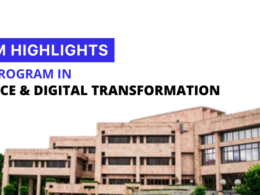Well, anyone who wants to become a Data Scientist!
You might have questions like whether I will be able to become a Data Scientist or not? Who are the people who actually succeed in Data Science jobs?
Don’t worry, we have got all the answers right here.
Who can become a Data Scientist?
Anyone who knows what a Data Scientist is and what he does. You can become a Data Scientist if you are:
– Fresher
– Experienced
– IT Professional
– A Domain Expert in health, automotive, finance, banking or any other sector
Being a Fresher doesn’t make you ineligible for the position. You just need to have undergone a well-structured Data Science tutorial, a great portfolio with some high-quality projects included in it.
I’m sure you know what Data Science is by now. So, let’s directly move to who is a Data Scientist and what he does.
Who is a Data Scientist?
A Data Scientist is a unicorn but not a magician. What does this mean? It is hard to spot a skilled and proficient Data Scientist.
In the middle of the Data Scientist hiring spree that most of the organizations are on, it is being assumed that a Data Scientist is being perceived as a magician; someone who will wave a wand and solve all the problems.
This is again not the truth!
Data Science is a scientific and step-by-step process, the organizations need to have the right infrastructure, the right team and team settings and the right organizational goals for a Data Scientist to be able to derive some tangible value out of data.
What does a Data Scientist do?
A Data Scientist always has a typical day, dealing with numbers; working on tools; analyzing and visualizing the data; deriving the insights and reporting the insights to the business stakeholders.
Think this is it? Think again! It is much more than that and isn’t as easy as it may seem.
Here is how the typical duties of a Data Scientist look like…
- Evaluating statistical models to interpret the validity of analysis of models
- Using machine learning to develop enhanced predictive algorithms
- Regularly testing and improving the productivity of machine learning models
- Designing data visualizations to summarize critical analysis and simplify it
Who is the perfect choice to be a Data Scientist?
You don’t necessarily need to be from the IT industry to become a Data Scientist. Whether you are from a health, automotive, finance or any other industry, you are indeed the perfect pick to be a Data Scientist, given you have some of the prerequisites.
Can anyone become a Data Scientist? You will require some sort of structured training to master your hand at Data Science. You can enroll for any Data Science tutorial, if: – You are technically sound
– You possess extraordinary non-technical skills
– You have practical knowledge of your subject
What makes you Technically Sound?
1. A Statistics and Mathematics enthusiast You have to have an elementary understanding of algebra and calculus. ![]() It is important for you to befriend the most critical concepts in Math and Statistics. These are Linear Algebra and Multivariable Calculus in Maths and Inferential Statistics, Hypothesis Testing and Probability in Statistics.
It is important for you to befriend the most critical concepts in Math and Statistics. These are Linear Algebra and Multivariable Calculus in Maths and Inferential Statistics, Hypothesis Testing and Probability in Statistics.
Why?
This is one of the primary steps that a Data Scientist should take because businesses can arrive at decisive results with small changes in algorithm optimization and predictive performance.
2. You know at least 1 programming language
Python should be an easy pick for you.
Any Data Science tutorial will favor Python as it is the most data-friendly language.
Why? You will start working on your projects using Python. Now, this is an easy language to learn and start coding.
One programming language for multiple platforms, Python is the go-to language of almost every business and organization. The simple reason for this preference- one of the biggest open-source platforms, easy to learn and can be integrated into the existing infrastructure.
Programming languages are an important skill-set for Data Science jobs and are like your 2am friends; being there for you anytime.
Languages like Python and R can save you from the wrath of being crushed under the weight of the data. They help you analyze large datasets. Working in data science projects becomes smooth sailing with a programming language.
3. Machine Learning
It will definitely be a valuable addition to your knowledge and expertise if you are familiar with the machine learning basics.
The reason is obvious- you will be required to work on data-driven products. As a data scientist, your role will be to work with machines that make valuable predictions to make informed real-time actions, with minimal human supervision.
Different tasks, such as data extraction, data interpretation and data analysis are automated in an algorithm-powered environment. The key to smooth processing, however, will be to know when to use which algorithm/technique.
Do you possess extraordinary non-technical skills?
1. Storytelling
As a Data Scientist, you are required to communicate business reports, data findings, intricate ideas and terminologies to the non-technical business stakeholders. Picture this- you are required to communicate the reason why did you pick linear regression and not random forest. A non-technical person will count on you to let these technical jargon and concepts make sense.
Weaving words and stories is the master skill of the Data Scientists. An impeccable storytelling ability combined with great visualization skills will make you a seasoned Data Scientist.
This makes technical stuff easily comprehensible.
2. Problem-Solving
This is one of the most integral non-technical skills for a Data Scientist.
He or she who has great problem-solving skills will be the right fit for Data Science jobs because he or she can make informed data-powered business decisions to help businesses scale higher.
A skilled Data Scientist is one who knows the right approach to the problem presented before him, asks the right questions to help arrive at the solution. Problem-solving skills cannot be taught in any Data Science tutorial. Your problem-solving skills will only improve with experience and help you advance to more amazing Data Science jobs.
3. Simplifying It
Those reports, trends analysis, insights details etc. can be a lot for a layman to comprehend. This is when intelligent and skilled Data Scientists like you will come into the picture.
They will break down the complexities and present it in such an engaging way that reports and insights will make even more sense to all. What Python gives you might make sense to you and not to the non-technical stakeholder. Do you ask how to go about honing this skill? Try explaining molecular biology to a fourth grader.
Are you gaining hands-on practical knowledge?
Theoretical knowledge is of no use until you know how you will apply it in the industry scenario. Imagine, how you will know which algorithm to apply in different business scenarios.
You can be assured that you have enough practical knowledge when you have:
1. Participated in Data Science competitions like Kaggle, Hackathon, etc.
These competitions give you an opportunity to face real-world challenges and scenarios. Your skills and learnings are put to test in these competitions and you realize what more should you do to excel.
2. Have a healthy GitHub portfolio
Include all your high-quality projects and work in your GitHub portfolio. This will be a practical showcase of your work. Do not forget to update it with each project that you complete.
3. Built a Precise, Data Science-focused resume
This means your resume should not be a keyword-stuffed packet; instead, include keywords relevant to your profile.
A recruiter spends 30 seconds on an average to scan a resume. This means a maximum of two-page resume will do wonders for you.
4. Earned a Data Science Certification from a reputed Institute
This will show your quest for learning new skills, remaining updated with the latest trends and will be proof that you possess the required skill set.
So, you reached to this point.
Great! This means you are clear about who can become a Data Scientist. As a Data Science aspirant, you need to set a time frame to master data science. This will ensure that you are on the right path to becoming a Data Scientist.
What’s the right time frame?
Our Chief Data Science Mentor at Accredian, Manvender Singh, says 6-9 months is an ideal time frame to master Data Science. This is a perfect time to learn one tool like Python, master Data Analysis, work on a couple of projects, complete machine learning, and build your resume and portfolio.
Keep the momentum going and you will be a stand-out Data Scientist really soon!







4 comments